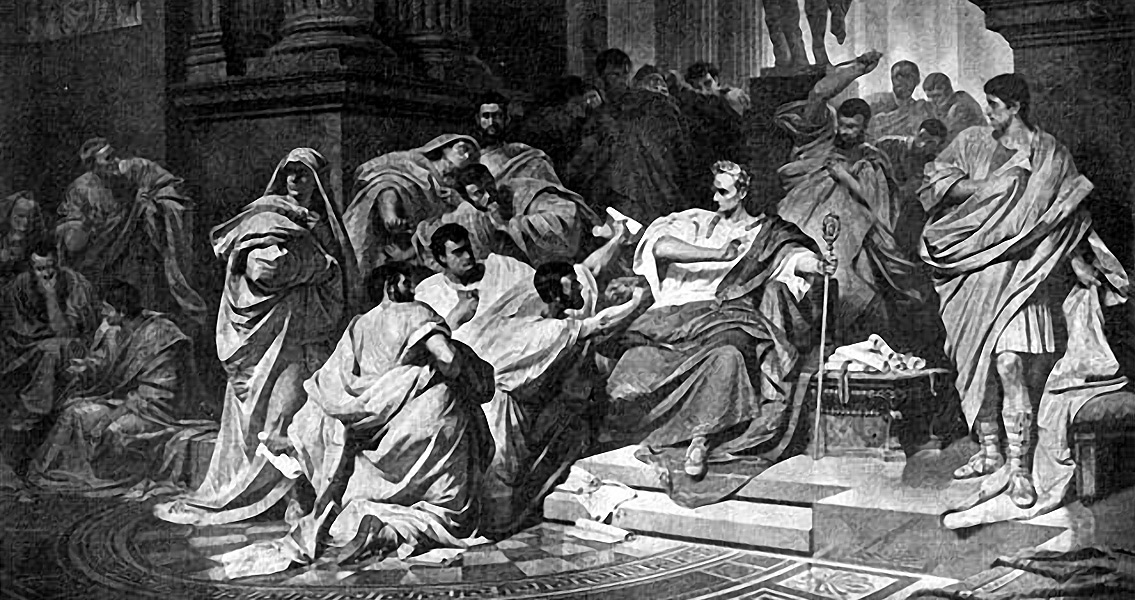<![CDATA[On the 15th March, 44 BCE, Julius Caesar was murdered by a group of Roman senators at a meeting hall next to Pompey's Theatre. The murder of Caesar is one of the most famous events in Roman history, immortalised in contemporary accounts as well as Shakespeare's famous play. The assassination also proved a key turning point, sparking a host of changes throughout the Roman Empire. The conspiracy to kill Caesar involved up to sixty Roman noblemen, with fourteen senators actually taking part in the stabbing itself. When Caesar entered the senate meeting, he was surrounded by a group of senators holding daggers. His toga was pulled over his head as the men started their brutal assault. Servilius Casca stabbed Caesar in the neck, before the other senators joined in the attack. Caesar was perhaps naive to have not anticipated the conspiracy against him, having become an increasingly controversial figure in Roman politics in the years preceding his death. Prior to Caesar's reign, Rome had a long established republican government. A well organised hierarchy distributed power, with two consuls with joint powers at the top of the government, above the Praetors, who took responsibility for legal matters. The next tier of the government was the Senate, which proposed legislation to the general people's assemblies. Caesar undermined this well established system. Although refusing to accept the title of king, he declared himself 'dictator for life', taking advantage of a contingency that was meant to be used on a temporary basis in times of unrest. Of all the conspirators, the presence of Marcus Brutus was perhaps the most shocking. Indeed, Caesar is claimed to have exclaimed "You, too, my child?" upon realising Brutus was also one of the assailants. Brutus' mother had been one of Caesar's lovers, and he had taken Brutus on as something of a protege. Even Brutus' decision to fight against Caesar in Rome's recent civil war had been forgiven, with Caesar promoting him to the rank of Praetor. Brutus' involvement in the assassination, let alone the fact that he had not been killed for his choices in the civil war, reveals a lot about the tangled nature of Roman politics in this period. Caesar's life was defined by conflict. His rise to political power was in large part a consequence of his military prowess. His reputation was forged between 58 and 50 BCE, with a series of spectacular military victories that brought much of what is modern day France and Belgium under the control of the Roman Empire. As his influence and status grew in Roman society however, Caesar found himself increasingly surrounded by enemies. This is believed to have been one of the key motivations behind his decision to snatch total power in Rome, it was a means to protect himself. In 49 BCE Caesar marched his troops across the Rubicon river and into Italy, starting the Roman Civil War which would end six years later with him installed as dictator. Following Caesar's death, Rome was again plunged into war. Caesar's rule was left to his adopted son Octavian. Years of fighting and political intrigue followed, including a long war with the eastern Roman Emperor Marc Antony, as well as Republican forces, before Octavian finally secured his position as the Emperor, cementing the autocratic Roman Empire started by his adopted father. Caesar may have died in 44 BCE, but autocracy in Rome survived long after his death. Image: 'Die Ermordung Cäsars' By Karl von Piloty (1826 - 1886) ]]>
The Death of Julius Caesar
